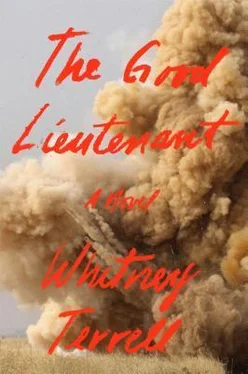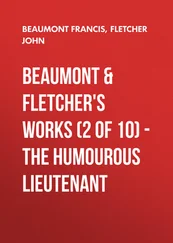“Wait a second, wait a second — where are you going?”
“The LT’s order is we stay here,” Crawford said. “Inside the wall.”
“What for?” Pulowski said. “What’s the point of going to the trouble to put this camera up if we’re not going to do anything about what we see?”
“You tell me, man,” Crawford said.
Pulowski paused. He looked up from the familiar rectangle of the laptop, its chrome highlights, the pleasing dry waffle of its keys, to Crawford’s glossy brown cheeks.
“Why did she have us stay inside the compound, then?” he asked. “It would’ve been faster if we’d all been out there doing a sweep.”
Crawford didn’t respond to this.
Pulowski looked up at the surrounding faces of Fowler’s platoon. Whatever interest or pleasure they’d shown when he’d originally fired up the camera had dissipated, and their expressions were blank, unfocused — not that far different than they’d been when he’d reported the loss of Sergeant Beale, just seventy-two hours ago. A nice little air pocket of unhappy.
In the center of it was him. He was the reason they’d stayed in.
“Okay, fine. I’m the idiot signal guy. I don’t know anything about field operations. I don’t know whether it means anything to see a dog out there or not. So I’m just asking for an opinion.”
“Could be one thing, could be another,” Crawford said.
“Don’t you think we should go check it out? Or at least alert them?”
“They ain’t got any coms,” Crawford said.
“All right,” he said. “Let’s do it.”
“Sorry, sir?” Crawford said.
Who the fuck is this idiot? Pulowski thought, listening to himself. What kind of moron leaves a protected compound when he doesn’t have to? It was a deep violation of the signal officer’s code. And yet, strangely enough, as soon as he spoke, he felt great. Not brave. Not smart. Just great. His hands had stopped shaking. He could handle fifteen minutes of stupidity if Fowler was genuinely at risk. “I said we’re going out. I’m the ranking officer here. Lieutenant Fowler, your lieutenant, is out there in the field. She’s got no perspective on this. She can’t see the terrain. How difficult is it to just drive down there and take a peek with a Humvee?”
* * *
When Masterson’s foot patrol started into the field — a line of thirteen soldiers holding their arms out for spacing — Fowler stood next to the captain and brushed his fingertips. They were nearly black, the dirt ground into deep half-moons beneath his fingernails, and he wore several days’ growth of beard. But the spackled, deformed skin between his glasses and his chin seemed less drawn and fearful, a tiny flicker of his frat-boy cheekiness coming back, and though she believed he deserved his fear, she also found its absence a relief. On either side of them were soldiers with metal detectors strapped to their forearms, waving their black disks over the furrows. “Worth a try,” Masterson said. “If he’s got a gun down there, they’ll get a beep. Faisal says he hears they put the body down in a well or something. For what that’s worth. Says he’s not sure he can find the actual place. But if Beale’s been down there since, what, Tuesday?”
Masterson waved a hand in front of his face and she realized that he was trying to warn her that the body might stink. She breathed in deeply through her nose, but all she could smell were the smells of the living: Masterson’s perspiration, which was sharper and more acrid than her own. The sweet ammonia of the dip the soldier beside them was chewing. “You trust him?” she said, nodding to Faisal.
The interpreter was upright now and walking several spots over in the line, hands cuffed behind his back. His lithe, handsome features appeared mushy, like a smashed melon, and there were scabbed patches on his scalp where he was missing chunks of hair. He wore his familiar rotten suit jacket over a gold Lakers jersey. No body armor.
“Hell, no,” Masterson said cheerfully. “But I’ve tried to make it clear to him that it would be a bad idea to lie.”
“You think he did it?”
“Killed your soldier?” Masterson grinned. “No, no — he was with me that day, I checked my battle journal.”
“But he could have been involved.”
“It’s the usual crazy Iraqi business. You ask one question, you get a thousand and one answers.”
“And the current one is?”
“The current one is that a couple guys ‘showed up’ at his house with Beale’s body. Asked Faisal for a place to hide the goddamn thing, and he sent them here.”
“He was already dead?”
“If you believe Faisal.”
“That’s a relief.” Fowler said the words, but she did not in fact feel this. As soon as she’d seen the interpreter’s wounds, the good feeling she’d had back in the Humvee with Pulowski had started to fade. “My guys were real upset about the possibilities.”
“The possibilities of what?”
“The possibilities of what might happen to a guy who’s left alone with a bunch of Iraqis. To do whatever they want.”
“Which are?”
“Which are bad enough to make my guys really pissed. We were mostly fobbits, you know. Before we lost Beale at that intersection, these guys were happy as hell to be working inside the wire, putting up walls for the general’s bowling alley.”
“So that’s how you got them to step up, huh?” Masterson said.
“It definitely helped,” Fowler said. She squinted, staring at the gauzy far end of the field. “I’m not going to say I didn’t use that information motivationally.”
* * *
They found nothing on the first pass. They’d gone down the wrong side of the field, Faisal claimed, weaving more and more Arabic into his sentences, though she knew his English was perfectly good — explaining that he hadn’t been in the field since he was ten. Then that he’d only been in it when it was dark. When he started in on his third explanation, one of Masterson’s soldiers drove a rifle butt into his ribs.
* * *
There was a canal at the field’s end, broached by a single corrugated drainage pipe. Masterson wobbled heel-toe back over the culvert, consulted with the Bradleys waiting there, then returned, snapping his chin strap back in place, and signaled his men to head back up the field’s east side. “How’s your kid brother doing?” he asked.
“My who?”
A fishhook twisted in her gut, but then Masterson’s smile relieved her — just fucking around. A crinkle of amusement. “We just got a call from your signal guy.”
Oh, Jesus , Fowler thought.
“Says he’s got a mad dog to check out up ahead of us.”
“Is he in trouble?”
“No, no — a little unauthorized air usage, but no. I said we’d meet them there.”
She tried to scrub her face of meaning, aware of his scrutiny off to her left side, the nosy wetness of his curiosity. “So you take shit seriously, don’t you?” he said. “Fucking tell Fowler you’ve got a tip, and she calls out the cavalry.”
A strange dry heat spread over her scalp with this remark, like a powder. It was meant to be a compliment, but the aftertaste was ugly, like she’d done something desperate and needy. “Was I not supposed to?” she said.
* * *
The radio chatter was interrupted by a calming, booming bass that Pulowski recognized as belonging to Waldorf, the somber black sergeant who commanded Fowler’s second team. “Hey, boys, we got a target. I need Charlie and Delta to go right at him, straight through the field. Dykstra and I are gonna swing around to the tree line, just in case he’s got buddies.” The rest was broken up by the sudden seasick jolting of the Humvee as Crawford accelerated through the field, and Pulowski, after his helmet ricocheted twice off the Humvee’s roof, scrambled to secure both his computer bag and the camera system’s wireless receiver, which tumbled and banged around the cabin like a brick in a washing machine. By the time the computer was clamped between his knees, there were several unexpected things happening, all in such a rough jumble that he found it hard to keep track. First, he was impressed by the speed and precision of the platoon, a speed and precision that Fowler — he could see her, or at least the line of soldiers that included her, hurrying up from the bottom of the field — no doubt had taught them. They circled like wolves around the “target,” Crawford charging in directly, flanked by the tank-like recovery vehicle they called the Hercules, while the other two Humvees, containing Waldorf and Dykstra, flared out to the right, one of them, apparently, finding a back road on his Blue Force Tracker and punching through the trees — out of sight but still in radio contact — while the other swerved along the field’s edge in case the target tried to run away. This was, he supposed, what the camera system really was — a hunting device. A target finder. It had been completely idiotic to imagine that it would be used in any other way.
Читать дальше












